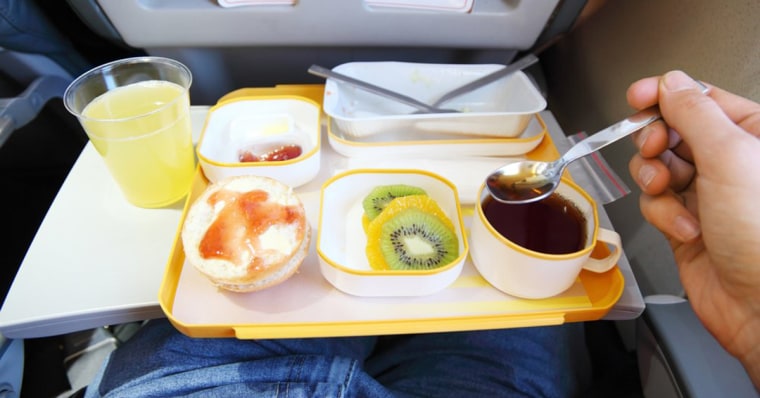If tomato juice tastes particularly delicious when you fly, while chocolate loses a bit of its magic, it might be your ears exerting a little influence over your taste buds.
A new study finds airplane noise can affect your perception of taste, enhancing some flavors while dulling others.
“To me, this is interesting because people complain about airline food all the time,” Robin Dando, the study co-author and an assistant professor of food science at Cornell University, told TODAY.
“Flavor is produced by our brain. It’s related to inputs from the environment; it’s related to the smell and taste of our food. But it’s also related to our other senses, too.”

Senses like hearing. So what happens when you dine in a noisy airplane cabin?
The study involved 48 people who sipped solutions flavored with the five basic tastes: sweet, salty, sour, bitter and umami. (If you’re not familiar with umami, it’s prominent in anything that has protein in it. So any time you’re eating something savory, like broth, soup, meats and cheeses, you’re tasting umami, Dando said. Tomatoes are also loaded with umami, as is soy sauce.)
The study subjects tasted everything either in silence or while being exposed to about 85 decibels of noise designed to mimic the hum of jet engines on board a plane. In fact, the noise “was recreated from actual airplane cabin noise recordings.”
It turned out the racket had two big effects: It dulled the taste of sweetness, but it made the taste of umami more intense.
“Whenever you fly, you notice that the most popular drink, it seems like, on a plane is tomato juice… it’s much more dominated by umami flavor,” Dando said. The German airline Lufthansa was so fascinated by its passengers’ love of tomato juice — who consume about 400,000 gallons of the ruby drink a year — that it ordered its own study. Bloody Mary, anyone?
Meanwhile, consuming a sugary snack or drink in the air might be a disappointment.
“If you bought a soda, it maybe wouldn’t taste quite so good… (because) the sweet taste was quite inhibited in our results,” Dando said.
The noise had no impact on salty, bitter and sour tastes in his experiment. But researchers continue to study how plane cabin environment — with its low humidity, lower air pressure, and continuous vibration — affects our taste. One researcher compared it to eating a meal while having a cold.
Dando said there are implications to his study beyond the plane.
“You can make things taste better or worse depending on changing that environment,” he noted, adding that some restaurants have started to produce a “soundtrack for their food” to enhance their customers’ culinary experience.
The study will be published in an upcoming print edition of the Journal of Experimental Psychology: Human Perception and Performance.